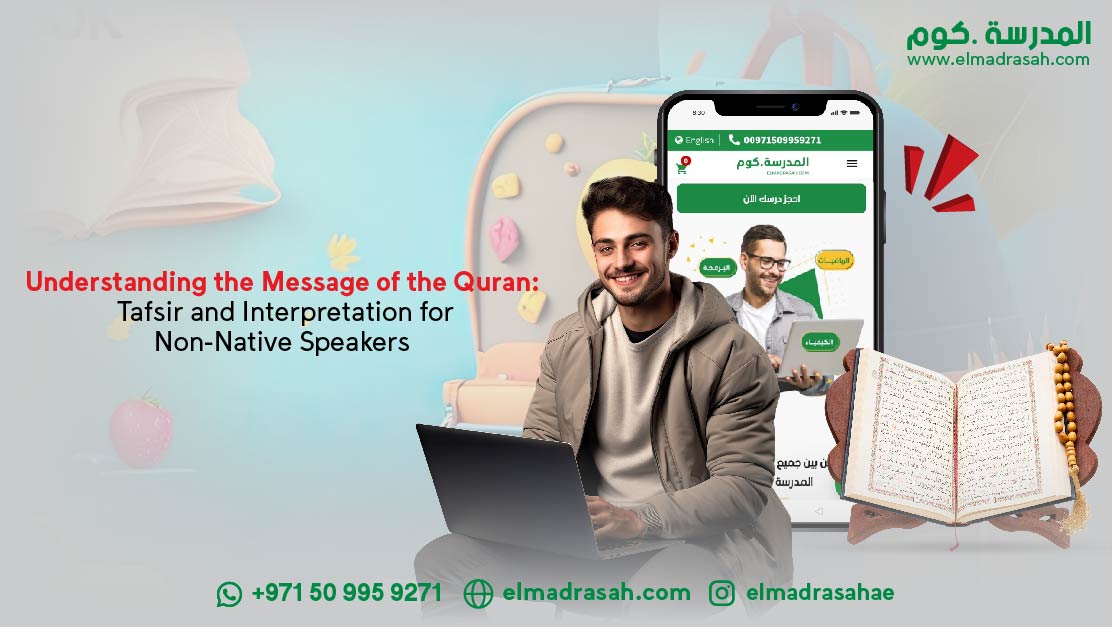
Understanding the Message of the Quran, the holy book of Islam is a source of guidance, wisdom, and spiritual nourishment for over a billion Muslims worldwide. However, for non-native speakers, delving into the profound messages of the Quran can be a challenging yet immensely rewarding endeavor. In this article, we will explore the significance of comprehending the message of the Quran, and the art of its recitation, and offer valuable tips for non-native speakers seeking a deeper understanding. Additionally, we will discuss the role of Tafsir (interpretation) and its connection to Quranic education, with a special focus on Elmadrasah.com Quran courses.
Understanding The Message of the Quran:
The Message of the Quran is both timeless and universal, addressing the fundamental questions of human existence and providing guidance on how to live a righteous and fulfilling life. At its core, the Quran calls for the acknowledgment of the oneness of God (Allah in Arabic) and the submission to His will. This central theme, known as Tawhid, lays the foundation for Islamic monotheism, emphasizing the indivisibility and uniqueness of the divine.
The Quran is not merely a set of rules and regulations but a comprehensive guide that covers various aspects of human life. It addresses ethical and moral principles, social justice, family values, and personal conduct. The verses of the Quran offer insights into the nature of human beings, the purpose of life, and the interconnectedness of the universe. Through its stories, parables, and commandments, the Quran provides a holistic framework for individuals and communities to lead a life that aligns with divine principles.
The Quranic message is conveyed through a rich tapestry of language and literary style. The Arabic used in the Quran is considered unparalleled in its eloquence and depth. The linguistic nuances and rhetorical devices employed in the Quran contribute to its unique and compelling style, challenging human intellect and transcending the boundaries of time and culture.
For non-native speakers, delving into the linguistic intricacies of the Quran can be a challenging yet rewarding endeavor. It is through understanding the language that one can fully appreciate the beauty and depth of the Quranic message. While translations offer a bridge for comprehension, they may not capture the full spectrum of meanings embedded in the original Arabic text.
The Quran also serves as a source of comfort, solace, and inspiration for Muslims facing the challenges of life. Its verses offer reassurance during times of difficulty, guidance in moments of confusion, and a roadmap for ethical decision-making. The Quranic message is not confined to a specific historical or cultural context; rather, it addresses the perennial issues that humanity faces, making it relevant for people of diverse backgrounds and experiences.
Moreover, the Quranic message emphasizes the concept of accountability. It teaches that individuals are responsible for their actions and will be judged based on their deeds. This concept of accountability serves as a moral compass, encouraging believers to act with integrity, compassion, and justice.
Understanding the message of the Quran involves more than just memorizing verses; it requires reflection, contemplation, and a sincere effort to implement its teachings in daily life. The Quran challenges individuals to question, seek knowledge, and strive for personal and collective improvement. It encourages believers to engage in acts of charity, promote justice, and uphold the rights of the vulnerable and marginalized.
The Message of the Quran is a beacon of light, guiding humanity towards righteousness, justice, and compassion. For non-native speakers, approaching the Quran with an open heart and a willingness to delve into its meanings can be a transformative journey. It is through this understanding that individuals can unlock the timeless wisdom embedded in the Quran, gaining insights that resonate across cultures and generations.
Recitation of the Quran:
Recitation of the Quran is a fundamental aspect of Islamic practice, and it holds a special place in the hearts of Muslims around the world. The Quran revealed in the Arabic language, is meant to be recited with beauty and precision, reflecting the divine nature of the message. For non-native speakers, engaging in the recitation of the Quran not only deepens their connection with the text but also serves as a means of spiritual elevation.
The Melodious Sound of Quranic Recitation:
The Quran is often recited with a melodic and rhythmic tone that has a profound impact on the listener. This melodious recitation, known as Tajweed, is not only aesthetically pleasing but also enhances the communicative power of the verses. Non-native speakers, while learning the rules of Tajweed, become attuned to the beauty and rhythm inherent in the Arabic language, making the process of recitation a transformative experience.
Spiritual Benefits of Recitation:
Reciting the Quran is not a mere exercise in pronunciation; it is a spiritual practice that brings about a sense of tranquility and inner peace. Muslims believe that the recitation of the Quran has a purifying effect on the soul, serving as a source of comfort and guidance. For non-native speakers, the act of reciting the Quran becomes a means of connecting with the divine, fostering a sense of spiritual closeness and serenity.
Tajweed for Non-Native Speakers:
Tajweed is the set of rules governing the proper pronunciation and intonation of Quranic verses. For non-native speakers, mastering Tajweed is a crucial step in approaching the recitation of the Quran with authenticity. Elmadrasah.com’s Tajweed classes, specifically designed for non-Arabic speakers, provide a structured and accessible platform for learning the intricacies of Tajweed. This ensures that non-native speakers can recite the Quran with precision, preserving the sanctity of the text.
Connection Between Recitation and Understanding:
The process of recitation is intricately connected to the understanding of the Quranic message. As non-native speakers work on improving their pronunciation and recitation skills, they simultaneously deepen their understanding of the meanings behind the words. This symbiotic relationship between recitation and comprehension creates a holistic approach to engaging with the Quran.
The Role of Emotional Engagement:
Reciting the Quran is not solely an intellectual exercise; it involves a deep emotional engagement. The verses, when recited with sincerity and reflection, evoke a range of emotions, from awe and humility to gratitude and repentance. Non-native speakers, even if they are not fluent in Arabic, can experience this emotional connection through the act of recitation, as the meanings of the verses resonate on a profound level.
Utilizing Technology for Recitation Practice:
In the digital age, technology has become a valuable tool for facilitating the recitation practice for non-native speakers. Online platforms, such as Elmadrasah.com, offer interactive tools, audio resources, and practice sessions to enhance the recitation skills of learners. This integration of technology ensures that non-native speakers have access to effective and engaging resources to perfect their Quranic recitation.
The recitation of the Quran is a multi-faceted endeavor that goes beyond the surface-level pronunciation of words. It is a transformative practice that encompasses spiritual, emotional, and intellectual dimensions. For non-native speakers, embracing the art of Quranic recitation becomes a journey of self-discovery and a means of drawing closer to the profound message encapsulated in the sacred verses. With the right resources and dedication, non-native speakers can embark on this enriching journey, unlocking the spiritual and linguistic treasures of the Quran through the beauty of recitation.
Tips for Non-Native Speakers:
Immerse Yourself in Basic Arabic Learning:
Learning the basics of Arabic is foundational for unlocking the meanings of Quranic verses. Tips for non-native Speakers can begin with fundamental Arabic courses that focus on vocabulary, grammar, and sentence structure. Elmadrasah.com offers structured Quranic Arabic courses tailored for non-Arabic speakers, providing a solid foundation for understanding the language of the Quran.
Understand the Importance of Context:
The Quran was revealed in specific historical and cultural contexts. Non-native speakers should strive to understand the circumstances surrounding the revelations, as this contextual knowledge can significantly enhance the comprehension of Quranic verses. Tafsir’s works, available through platforms like Elmadrasah.com, offer valuable insights into the historical backdrop of each revelation.
Benefit from Quranic Translations:
While nothing can replace the eloquence of the original Arabic, translations serve as indispensable tools for non-native speakers. English translations, for example, can bridge the linguistic gap, allowing individuals to grasp the general meaning of the verses. It’s advisable to use multiple translations and cross-reference them to gain a more comprehensive understanding.
Explore Tafsir for In-Depth Understanding:
Tafsir, or Quranic interpretation, is a treasure trove of knowledge. Non-native speakers should explore reputable Tafsir works to gain insights into the linguistic nuances, historical context, and scholarly perspectives on Quranic verses. Elmadrasah.com’s Tafsir workshops can be particularly beneficial in providing structured guidance on navigating these interpretations.
Develop Tajweed Skills for Correct Pronunciation:
Tajweed, the art of proper pronunciation and recitation of the Quran, is essential for non-native speakers. Correctly enunciating Arabic sounds enhances the beauty of Quranic recitation and ensures accurate communication of the intended meanings. Tajweed classes offered by platforms like Elmadrasah.com provide a systematic approach to mastering these pronunciation rules.
Establish a Consistent Reading Routine:
Consistency is key when it comes to understanding the Quran. Non-native speakers should establish a regular reading routine, dedicating specific time each day to engage with the text. Whether it’s a few verses or a chapter, a consistent routine fosters a deeper connection with the message and facilitates gradual comprehension.
Engage in Reflective Reading and Contemplation:
Beyond the mere recitation, non-native speakers should engage in reflective reading. Take time to ponder over the meanings of the verses, contemplate their implications, and relate them to personal experiences. Reflective reading transforms the Quran from a text on paper to a living guide that addresses the complexities of daily life.
Seek Guidance from Knowledgeable Sources:
If non-native speakers encounter difficulties in understanding specific verses, seeking guidance from knowledgeable sources is encouraged. Scholars, teachers, and online forums can provide valuable insights and clarification. Elmadrasah.com’s online community may offer opportunities to connect with experienced instructors and fellow learners for support and discussion.
The journey to understand the message of the Quran is a multifaceted one for non-native speakers. By combining language learning, historical context, and engagement with diverse resources, individuals can deepen their understanding of this timeless scripture. Elmadrasah.com’s Quranic courses, encompassing Arabic learning, Tajweed, and Tafsir, serve as invaluable tools on this journey, providing structured guidance for non-native speakers seeking a meaningful connection with the Quranic message.
Elmadrasah.com Quran Courses:
Elmadrasah.com is a leading online platform that offers a range of Quranic courses, catering to the diverse needs of learners. Their Quran courses are specifically designed for non-native speakers, providing a comprehensive and structured curriculum to facilitate understanding and recitation.
Quranic Arabic Courses:
Elmadrasah.com‘s Quranic Arabic courses are tailored to the needs of non-Arabic speakers. These courses focus on teaching the fundamentals of Arabic grammar and vocabulary, enabling students to comprehend the Quran with greater ease.
Tajweed Classes:
Tajweed, the correct pronunciation of Quranic verses, is a fundamental skill for every Muslim. Elmadrasah.com’s Tajweed classes offer a step-by-step guide to mastering the rules of Tajweed, enhancing the recitation skills of non-native speakers.
Tafsir Workshops:
Understanding the context and interpretation of the Quran is crucial for a comprehensive grasp of its message. Elmadrasah.com provides Tafsir workshops that guide non-native speakers through the meanings and nuances of Quranic verses, enriching their understanding of the text.
Conclusion:
In conclusion, understanding the message of the Quran is a journey that requires dedication, patience, and the right resources. For non-native speakers, the combination of learning basic Arabic, utilizing translations, exploring Tafsir, and engaging in reflective reading is key to unlocking the profound wisdom of the Quran. Elmadrasah.com‘s Quran courses play a pivotal role in supporting non-native speakers on this journey, providing a structured and accessible platform for learning and growth. As we embark on this quest for knowledge, may we find inspiration, guidance, and spiritual fulfillment in the timeless message of the Quran















